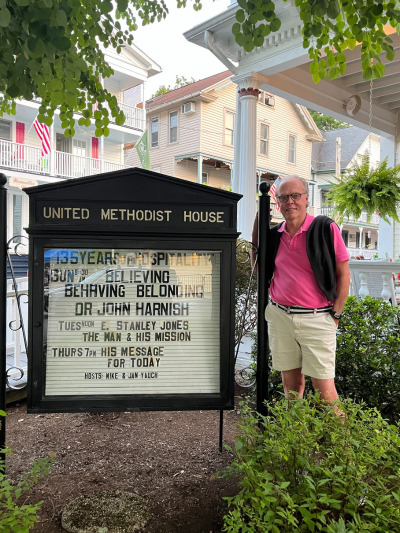Retired pastor John E. Harnish reflects on how the model of Chautauqua should inspire churches to speak to the intellect and mind as well as the soul and spirit.
JOHN E. HARNISH
Retired Pastor, Michigan Conference
My wife, Judy, and I spent last week at the Chautauqua Institution in southwestern New York State, where I was the chaplain of the week at the United Methodist House. Each week of the nine-week season, a volunteer chaplain preaches in the House’s chapel on Sunday, then offers two chaplain chats on the porch during the week. I focused on E. Stanley Jones and my book Thirty Days with E. Stanley Jones.

Chautauqua is the granddaddy of the summer communities like Epworth Heights and Bay View in Michigan, Lakeside Chautauqua in Ohio, and other “Daughter Chautauquas” that sprang up around the country in the late 1800s. The Chautauqua experience was built around its four pillars—arts, education, religion, and recreation.
From the late 1800s until the 1920s, traveling “Tent Chautauquas” moved west and south across the United States, offering high-quality music and famous preachers and politicians to towns far removed from the culture of cities back East. President Theodore Roosevelt called the movement “the most American thing in America.”
Begun by Methodists for training Sunday school teachers, Chautauqua quickly took on this broader purpose of cultural and intellectual pursuits because they believed the arts and the intellect mattered to formation as much as the faith.
The Methodist founders of Chautauqua weren’t afraid of ideas.
They knew ideas could be dangerous, but they believed the whole community would be stronger with the free flow of education and information, art and culture, alongside faith and religion.
I saw a post recently which said, “Book banners aren’t afraid of books; they are afraid of ideas,” and maybe they should be. Ideas can change your view of the world. Education can break through long-held prejudices and challenge deeply rooted opinions. New ways of understanding history and new insights from science can contribute to a richer, fuller grasp of what it means to be human. Silencing diverse ideas and banning books just because they offer a different perspective on life is a sure path to the death of the soul and the intellect. In our day, when science and open exploration of our national history are under attack, the model of Chautauqua should inspire our churches to speak to the intellect and mind as well as the soul and spirit.
We only have one glimpse of Jesus’ teenage years. The Gospel writer says, “And Jesus grew in wisdom and stature, and in favor with God and [humankind]” (Luke 2:52, NIV). We should want no less for our children and ourselves—to grow in intellectual knowledge, physical health, and proper relationship with God and people because that’s what it means to be a whole person.
The early Chautauquans understood this, and in our better moments, so do we.
Last Updated on August 8, 2023

